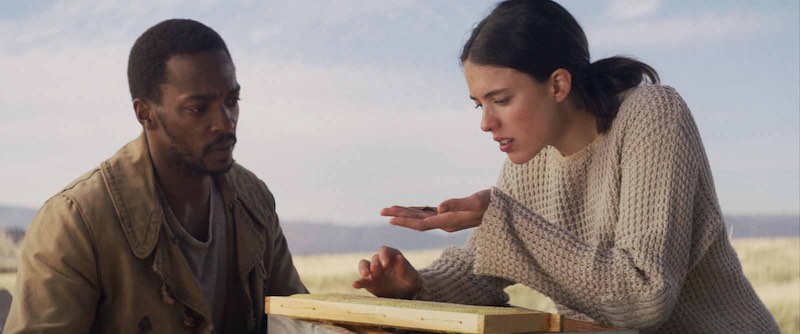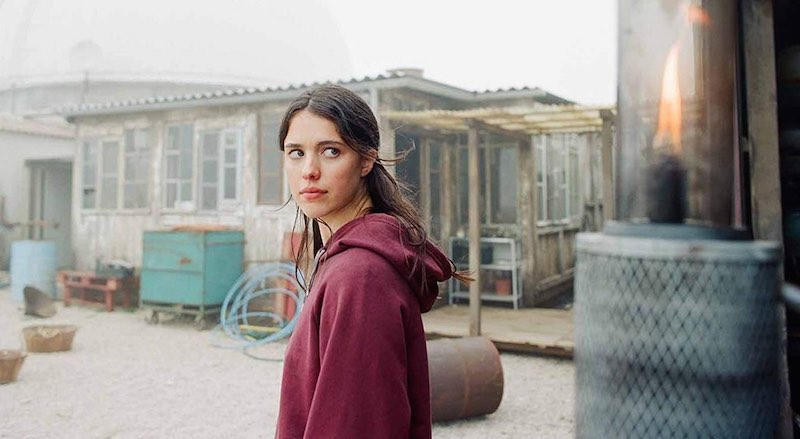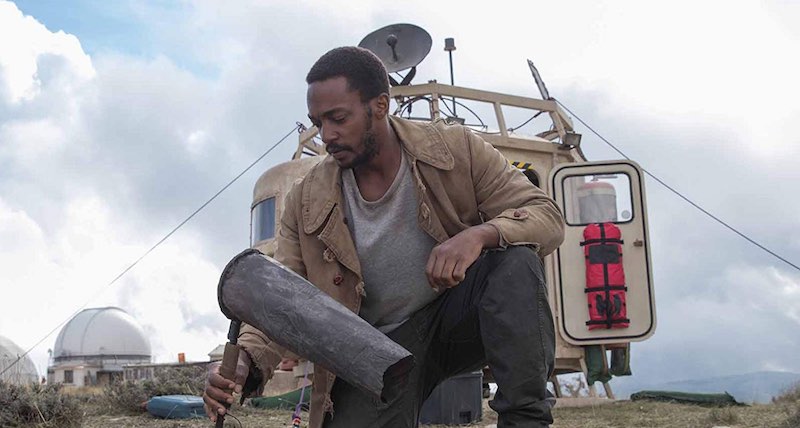
Netflix's 'IO' Review
Lacking conflict and a strong protagonist, IO makes fleeing Earth because of climate change destroying the planet a good idea.

Release Date: January 18, 2019
MPAA Rating: NR
In IO, Sam (Margaret Qualley), one of the last survivors on a post-cataclysmic Earth, is a young scientist dedicated to finding a way for humans to adapt and survive, rather than abandon their world. But with the final shuttle scheduled to leave the planet for a distant colony, her determination to stay is rocked by the arrival of another survivor, Micah (Anthony Mackie). She must decide whether to journey with him to join the rest of humanity and begin life anew, or stay to fight for Earth’s survival.
Director: Jonathan Helpert
Screenwriter(s): Clay Jeter, Charles Spano, Will Basanta
Producer(s): Jason Michael Berman, Laura Rister
Cast: Margaret Qualley (Sam), Anthony Mackie (Micah), Danny Huston (Henry), Tom Payne (Elon)
Editor: Jeff Betancourt, Mike Fromentin, Tony Randel
Cinematographer: Andre Chemetoff
Production Designer: Francois-Renaud Labarthe
Music Score: Alex Belcher, Henry Jackman
Climate change and the potential of Earth being unable to sustain life of any kind is terrible. Depending on what scientist you believe, we’re headed for just that in a certain amount of years, making the need to find another inhabitable planet to colonize inevitable. Or we all die out and let Earth regenerate itself for a new evolution of species. Netflix’s IO explores both of these possibilities, without developing any real conflict, leading to a very unemotional end of the world story.
IO and the Death of Earth
Sam (Margaret Qualley from “The Leftovers”), the daughter of a scientist who told humans to remain on Earth even as it was dying, narrates IO. She explains what happened to Earth, and makes it very clear that she believes pollution destroying the planet is part of human nature. People began dying in their sleep or suffering horrible effects of the atmospheric change in the streets. It was unstoppable, so the Exodus Mission took place, where 100 ships left to set up shop as a colony next to a volcanic Jupiter moon, known as IO.

Sam did not go, nor did her father Henry or mother, and before long, we discover that others made the same choice. Henry believed that humans could adapt to the new ammonia-full atmosphere and that other lifeforms would do the same, and publicized it to the world. He’s dead in IO, and Sam is all alone to fend for herself in what she refers to as a mountain-top pocket of air — the last of its kind it seems. She’s trying to adapt herself to the new atmosphere with injections and is able to grow her own food and sustain some insect life. The bees are imperative, and whether they can adapt is part of her work. Sam may not be a school-trained scientist but her father taught her well, and she documents the changes occurring on Earth each and every day.
Problem is, you don’t care.
IO Lacks Exactly What It Needs
The scientific part of IO, of which the beginning of the film focuses, is very interesting. Learning how the world died and how this young woman is surviving definitely piques your interest. It’s when the introduction of a would-be love interest in Micah (Avengers: Infinity War‘s Anthony Mackie) arrives on the scene via a hot hair balloon, with what can only be referred to as an age-old looking space capsule, things disintegrate fast.

Micah appears to have an agenda, setting the stage for him to be the antagonist in IO. He’s not. In fact, he’s quite boring and his backstory severely lacking. He loves to emphasize that people should not be alone and urges Sam to leave with him on the final launch to IO in a few days. There is no chemistry between Sam and Micah, so as you consider how the two of them could stay on Earth and play Adam and Eve for a new world, you can’t help but dismiss the idea quickly.
The creepy stares Sam gives Micah don’t help the situation.
Sam does seem interested in leaving because of troubles that have occurred lately, but there’s always a sense that she’d rather die on Earth than travel to space. It’s the scientist in her; she still believes that there is hope for humans evolving. And of course it is possible, but that’s where the glaring hole in IO’s science appears.
Netflix's IO and the Evolution Issue
What IO forgets is that evolution takes time, and while we do not know for sure how long Sam has been living on Earth post-Exodus, it can’t be more than a decade, maybe two. It doesn’t seem plausible that a human body could adapt that quickly to an entirely new atmosphere. And then there’s food — the trees are living but aside from Sam’s greenhouse, there’s nothing edible on Earth anymore. And the animals are all dead.
I’d love to think that evolution can happen in, say, 10 years, but come on. That’s ridiculous. But it’s what IO wants us to believe, right up until the final scene.
I didn’t buy it and you won’t either. And who’d want to live in a decaying city that has an ammonia cloud hovering over it every day anyway? Sam, that’s who, and given that her character is never developed to be likable, you don’t care whether she sticks around Earth or goes to space. You’re more happy to hear her stop transmitting forlorn messages to IO that lack an active voice that would make you consider her theories of Earth sustaining life again feasible.
Netflix’s IO, though, really suffers from its lack of a villain. There’s no conflict unless you consider Earth itself to be what Sam is fighting against. But she’s not. She’s actually trying to adapt to the change in nature and is not fighting against it or seeing it as a problem. And since Micah turns out to be as worthless as a wet towel when you need to dry off, offering absolutely no dramatic bite to the story, IO ends up as a story without disruption. And disruption is what keeps a viewer interested.
Netflix’s IO isn’t going to keep your interest, and if you do manage to make it to the end, you’ll just scratch your head at the lack of scientific explanation present. You may then consider how IO makes climate change look great because it got rid of Sam.
If you want to see a great movie about the after-effects of climate change and how people survive an Earth that is fighting against them, check out Z for Zachariah. It has plenty of tension thanks to the chemistry between cast members Chiwetel Ejiofor (12 Years a Slave), Margot Robbie (Suicide Squad), and Chris Pine (Outlaw King).


